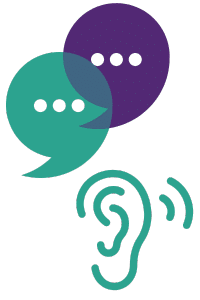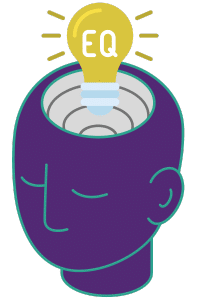Organisational leaders need to get the best out of all their staff; ensuring everyone feels valued, respected and empowered to contribute in their team. This inclusive approach to leadership can be applied to every area of their day-to-day work, but is brought to life in the deployment of three key tools, which we have explored below:

Active Listening
Inclusive leaders must do more than just listen to their team members’ words; they need to try and understand their perspectives and feelings, from a place of empathy. This involves active listening – distraction-free conversations to which they can give their undivided attention, asking open questions to get the full picture and taking time to properly reflect on what is being said.
Beyond making people feel included, active listening helps leaders ‘hear’ creative solutions and innovative ideas that might otherwise have been lost in the ‘noise’ of a busy working environment. Diversity of thought is a key benefit of a diverse workforce, but it takes inclusive leaders to unlock these benefits and realise this potential.
Practical Tip
Schedule regular one-on-one meetings with team members – separate from formal performance reviews – to discuss their experiences, challenges and suggestions. This fosters open communication and demonstrates that you value their input.
Emotional Intelligence
Being emotionally intelligent is about more than awareness of (and control over) one’s own emotions, it’s also about discerning and responding to the emotions of others. In this way, it’s an essential skill needed to meet the needs of a diverse professional team. Inclusive, emotionally intelligent leaders can detect the smallest microaggressions and pick up on every hidden unhappiness – allowing them to take actions that create a welcoming, supportive and psychologically safe working environment.

Practical Tip
Your level of emotional intelligence is far from fixed – dive into its ‘learnable skills’ by researching them, assessing yourself against them and seeking out learning & development opportunities in areas of potential growth. Start paying closer attention to the non-verbal cues, moods and feelings of your staff in order to factor in and respond to their emotional states.

Equality & Diversity: Awareness and Commitment
Awareness and commitment can be considered a ‘tool’ when combined, because together they are used by leaders to shape a diverse workplace that offers equal opportunities to its people. In this context, awareness goes beyond familiarity with company policies and employment law, it means proactively developing understanding about all the protected characteristics, from religious holidays to the menopause. Leaders that are committed to being inclusive will proactively seek out diverse perspectives and create opportunities for underrepresented groups.
Practical Tip
Implement training programmes that raise awareness of equality, diversity & inclusion issues and give everyone knowledge and skills to work inclusively. Encourage (and use) diverse hiring practices. Celebrate cultural events and create platforms for team members to share their backgrounds and experiences. Make sure that socialising events don’t consistently exclude certain groups; those with faith-based practices or care responsibilities, for example.
Eliesha can support or kickstart your journey to an inclusive leadership culture with engaging and interactive face-to-face or virtual workshops, which deliver practical tips just like the ones in this email and handle their sensitive subject matter with care.
Available titles include Managing & Leading Inclusively, Unconscious Bias, Introduction to Emotional Intelligence, Managing Diversity & Inclusion and EDI Fundamentals. We have also supported customers like fire services and housing groups with bespoke projects, tuned to their exact requirements.
To request any course outlines or set up an exploratory chat, get in touch now!